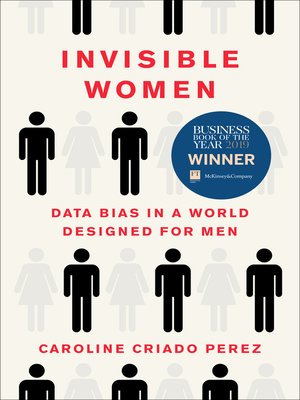ralentina reviewed Invisible Women by Caroline Criado Perez
Well-researched, pop data feminism
3 stars
In a nutshell, the author argues that there exists a fundamental gender data gap, and that this gap makes life harder for women, and harms society at large. The book presents evidence of this gap in different realms: planning (where decisions are based on the needs and behaviour patterns of a 'standard' person', meaning a man), on the workplace (where pressure to work long, unpredictable hours, poor maternity benefits, longstanding biases and lack of female representation at the leadership level) to design (where technologies and tools are tailored to men's bodies and priorities). I also appreciated the concern with different places and classes: although Perez never explicitly mentions capitalism or colonialism, and racism only rarely, some of her examples speak for themselves. There are many fascinating examples, and the author has a remarkable capacity to explain the ramifications of the gender data gap, its costs for women and society. However, I have three fundamental issues with the book.
-
First, the author clearly understands data to mean quantitative, preferably statistical data. This is great (I too love that kind of data), and may a useful approach for a book that clearly hope to persuade people beyond the feminist circles, such as (man) policy-makers, CEOs or planners. However, given the tremendous contribution of women thinkers to the problematisation of positivism, it may have been useful to address, or at least discuss, this focus.
-
Engaging with the broad arguments of feminist theory may also have helped the author to take a more nuanced approached to the gender binary. Granted, acknowledging the neither sex nor gender are binary, and that the relation between these sets of categories are complicated, may have 'muddled' the argument, and perhaps alienated some people in the audience. However, especially when dealing with sensitive issues such as health or gender violence, it seems problematic to completely ignore trans issues and experiences. And it isn't only trans people who are harmed by the binary: consider for example her discussion of parental leave in tenure-track systems (82-83). Citing a report by the NYT, Perez questions the family-friendly policy that gives academics one extra year to secure tenure for each child. Given the women use the extra time to care for the children, while men use it to publish, leaving childcare to their (usually female) partners, the policy benefited men more than women. I was not aware of this research, and found it interesting: what would a better policy look like? Perez believes the solution is to only allow women the extra-time, but that surely will only reify such unequal distribution of childcare, reinforcing the idea that looking after kids is a woman's job?
-
More fundamentally, the basic premise of the book is that the gender data gap is responsible for sexism, or at least that addressing the data gap would help us close the 'inequality gap'. But is the problem really one of knowledge? Isn't it the case that the situations perfectly please those who have the most power to change it? An excellent example is Perez' discussion of Britain's austerity measures between 2010 and 2020 (p. 245). Based on data by the Women's Budget Group, she shows that budget cuts hit women twice as hard as men, with Asian women and single-mother being the most affected, and men in the richest 50% of households actually gaining from the cuts. 'So why is the UK government enacting a policy that is so manifestly unjust?' asks Perez. 'The answers is simple' - she assures us -'They aren't looking at the data'. That is clearly naive: virtually all those involved are men in the richest 50% of households (probably richest 1%), with enormous power. It isn't ignorance, it's politics.
The book is light on theory and definitions, aside from some quick clarifications on sex and gender in the preface. This isn't necessarily a bad thing: it will probably be appreciated by those who will hopefully read it. And the style is compelling: perhaps I could have done with less numbers and more discussion of those numbers, but I know many men who will appreciate her 'rational' style. I don't know if it is a convention or an editorial decision, but I was mildly annoyed by the ocean of reference given just as an URL.

